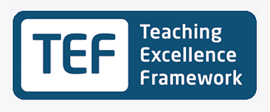 Excellence in teaching? Not quite.
Excellence in teaching? Not quite.
The results of the U.K.s 2017 Teaching Excellence Framework (TEF) have been released. Click here to view the results of the Gold, Silver, and Bronze university awards (official government results are here).
The purpose of TEF is to “…shin[e] a spotlight on learning and teaching in higher education, with a view to making it as much of a priority for universities as research.”
TEFs existence is the result of wounds self-inflicted by generations of higher education leaders who, for one reason or another, did not pay much attention to teaching. Look at the details of the TEF report: Even those universities who received Gold awards likely teach in traditional ways that are not much better than any other university. In other words, teaching may not have been much of a priority among the Gold universities either.
Please know that I am not picking on U.K. higher education institutions. The situation is the same or very similar in the U.S., and likely in most other countries as well.
Universities have long had piles of data from students course evaluations and other sources to know that, overall, teaching is mediocre. Sure, there are some very good teachers, but there are more average and below average teachers, in part because the system does not reward professors’ effort to become excellent teachers. Those who achieve excellence do so in spite of the many disincentives.
In most cases, it comes down to one’s own personal desire and motivation to be an excellent teacher.
In the U.S. the drift in focus from teaching to research happened over a period of about seven decades. Deficiencies in teaching had to be fully apparent by the third decade. So what has been going on over the last four decades? If the average tenure of a university president is 8 years, that means there have been five generations of university presidents who have largely ignored teaching. That is a shameful legacy.
It seems irresponsible to lead an institution of higher education and ignore teaching. In the U.S., the focus of university presidents, almost uniformly, are these three things:
- Increase enrollment and retention
- Obtain financial gifts from patrons
- Obtain grant money from government funding sources
How successful can a university be if everyone is doing the exactly same thing, albeit in slightly different ways? Where are the ideas, creativity, and original thinking that one would expect from the brainy team of administrators, staff, faculty, and students?
Will TEF improve teaching? My guess is that, in general, people will work harder to game the TEF system (see my post, “Evidencing Improvement“) than they will to improve teaching. If that happens, then many more institutions will put themselves at greater risk of not surviving.
Finally, how did the U.K. universities who adopted Lean fare in TEF? It is impossible to say because most of the application of Lean has been to administrative processes. There has been some application to teaching, but mainly in work such as creating tests. If you have more information on this, please share it here.
